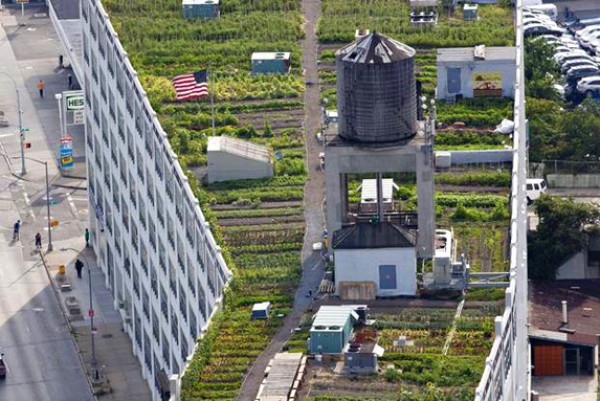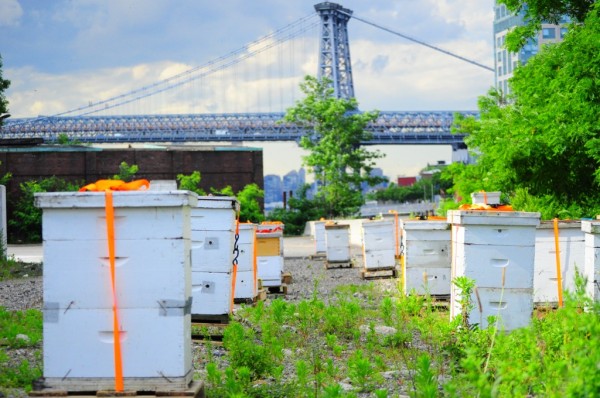If you’re interested in the future of the city, you could do worse than to look to New York City. Established as a trading post way back in 1624, it’s an urban center that’s been around awhile, and, as a consequence, has had some time to develop some familiar issues: food deserts in low-income neighborhoods, the Heat Island Effect associated with huge expanses of hardscape, airborne pollution, old, inefficient buildings, and storm water runoff that contributes to the pollution of local waterways. It’s also the city that’s helping to pioneer a rooftop farming revolution with the potential to take a big bite out of all of these problems, while putting fresh, local foods on the plates of New Yorkers.
One organization helping to lead the charge is Brooklyn Grange. Started in 2010 by five friends with a vision of growing food on the rooftops and unused spaces of New York City, Brooklyn Grange currently has over two acres of rooftop farms under cultivation in Queens and Brooklyn. In the two years since Ben Flanner, Gwen Schatz, Anastazia Plakias, Chase Emmons and Michael Meier (and their family members) first labored in the sun and wind, amidst the cacophony of traffic from down below, to spread and 3,000 pounds of soil across that first rooftop at Northern Boulevard, the group has produced and sold over 40,000 pounds of vegetables to restaurants, CSA members and directly to the public via weekly farmstands.

While the business is financed through a combination of private equity, loans, grassroots fundraising events and crowd funding platforms, it broke even in its first year and grew by 40 percent in its second year. Brooklyn Grange now has plans to expand to an additional acre of cultivated rooftop in its third year, and to extend its rooftop farming empire each year thereafter, as sales allow.
Recently the group has even expanded beyond its mission to grow vegetables, adding egg-laying hens to the mix and even a commercial apiary, cultivating bees for honey and breeding regional hardiness into their DNA. (These bees now join those at the Waldorf Astoria in claiming Big Apple rooftop digs.) Brooklyn Grange has also launched an educational non-profit arm, City Growers, which hosts thousands of local youth each season for educational tours and workshops.

Nor is Brooklyn Grange alone, as organizations like Gotham Greens and Bright Farms are engaged in kindred operations, and now even the city has gotten in on the act with a recent request for proposals for a 200,000-square-foot rooftop farm on a city-owned building on Food Center Drive in Hunts Point in the Bronx. All of which led Joe Nasr, co-author of “Carrot City: Creating Places for Urban Agriculture” and a researcher at the Centre for Studies in Food Security at Ryerson University in Toronto, to tell The New York Times, “In terms of rooftop commercial agriculture, New York is definitely a leader at this moment.”
Will such rooftop operations will expand to the point of helping to eliminate fresh food shortages, cut the amount of heat radiated by New York’s many buildings, improve local air quality, insulate buildings and filter storm water run off? Only time will tell. But such efforts have the potential to accomplish all of these things with one fell swoop, giving city-dwellers everywhere yet another reason to love NYC.